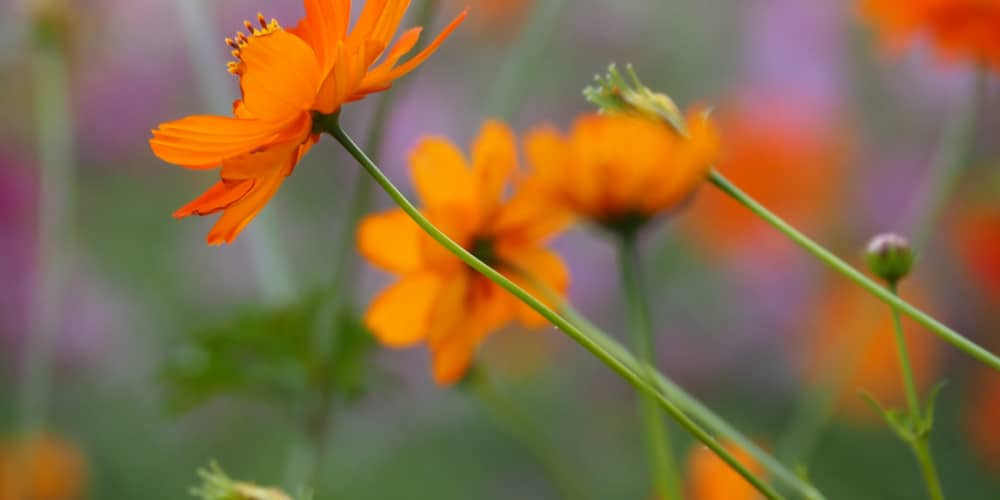You might have heard of the colorful cosmos plant before. This annual species is a common choice among many gardeners. After all, it is a relatively easy-to-care-for plant that will enhance the look of most landscapes. Besides the showy petals, the plant also displays dense fern-like foliage, which adds texture and volume to gardens.
Many people love growing cosmos because they adapt to most growing conditions. However, things do not always go as you plant them. It is not uncommon for gardeners to deal with cosmos not flowering. And if this happened to you, we understand the frustration.
But we have good news! We put together all the information you must have on hand in this essential guide. Here, you’ll learn the most common reasons for cosmos to fail to display their blooms. So, are you ready to start?
Cosmos Not Blooming: All You Need to Know

Despite cosmos being a low-maintenance plant, they require you to take care of their needs. Indeed, if you fail to give them what they need to thrive, they will have issues growing. Usually, one of the most common reasons for the lack of flowering in your cosmos plants is inadequate lighting.
Indeed, these flowers need plenty of direct sunshine to produce blooms. Other reasons include applying too much fertilizer, overwatering, or inappropriate climate. Jump in the following sections to learn about each factor in greater detail.
Inadequate Lighting
Cosmos aren’t particularly challenging to grow after you learn about their requirements. And while there aren’t many, one of the most crucial is providing your plant with the proper sunlight.
Indeed, these plants are different from other species: they are short-day plants that need 10 to 12 hours of darkness to produce flowers. However, they also need plenty of sunlight.
You may not know this, but cosmos plants are native to Mexico. So, they prefer a warm climate and do not mind getting direct sunlight. Avoid planting them in shady areas of your garden, as they will grow leggy without producing flowers.
If you have trees or shrubs in your garden, consider trimming them to allow more light to get to your plants.
Overfertilization
People believe that applying fertilizer will solve any issue with a plant. And while adding more nutrients to your plant may help, overdoing it will cause more harm than good. Avoid overfertilizing your cosmos.
After all, these plants don’t need many nutrients. Indeed, they prefer growing in well-draining sandy soils, even those not rich in nutrients. Some plants might need compost or manure. But cosmos won’t do well in fertile soils: they will produce dense foliage with few flowers.
And while this might sound counterintuitive, the truth is that slight nutrient deficits might stimulate the production of blooms in the cosmos. So, if you are treating your soil, suspend the application for a while before planting your flowers.
Too Much Water
The same concept we described above applied to water. You must always consider the native environment of the plants you decide to add to your garden. Since cosmos thrive in warm (and dry) weather, adding too much water can cause issues.
To begin with, you must plant your cosmos in well-draining soil. Don’t worry about leaving your plants without water for a couple of days: cosmos thrive even in drought conditions. Leaving the substrate moist might promote foliage growth at the expense of flowers.
Remember to feel the soil with your fingers before adding extra moisture: if it isn’t dry, wait a couple of days more before watering your plants. Also, if you notice the ground doesn’t drain well, consider adding sand to the mixture: it will improve water retention and recreate the natural growing conditions cosmos thrive.
Immaturity
Another reason why your cosmos might not produce flowers might be that you planted them too late. Ideally, the best months to plant cosmos are March and April. Sowing the seeds too late might delay flowering and cause growth issues.
However, with patience (and proper care), you might still be able to see blooms later in the season. But planting your cosmos too early might damage them harshly and result in no germination. So, check your local climate conditions and avoid sowing your cosmos seeds when there might still be the threat of frost.
It is possible that deer have eaten your cosmos. They don’t really like them very much, but if the stems look like they’ve been nibbled on, keep your eyes open for them.
